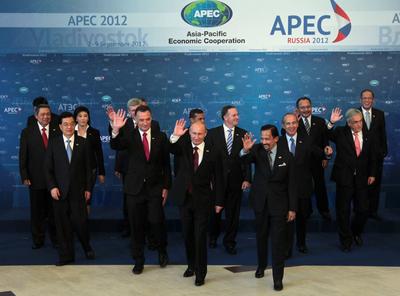The global financial crisis, the European debt crisis and structural imbalances in the world economy have stalled trade openness across nations and led several countries and regions to adopt protectionist measures. Against this backdrop, APEC decided to refrain from trade and investment protectionist measures until the end of 2015 and not follow any WTO non-compliant measures. Both decisions are a move in the right direction. However, not giving enough importance to India, which could be another catalyst for promoting trade reform among emerging economies, is not a good idea.
Food availability and food security, amid rising food prices across nations, was another important global issue on the APEC agenda. Agricultural issues such as investment, sustainable agricultural techniques, and innovation and technology transfers were up for discussion to ensure better agricultural productivity growth across the Asia Pacific. The commitment of APEC leaders in Vladivostok to improve food production, distribution and farmers’ welfare is in step with addressing the world’s food crisis. Food trade, which has the potential to stabilise food prices across countries, and maintaining safety standards will be crucial in maintaining social harmony within and across countries. Given India’s population, it was imperative that India be given a chance to participate in the discussion on agricultural productivity through technology transfers, rather than remain an observer.
APEC also committed to achieve a 10 per cent improvement in supply chain performances by 2015 in the Asia Pacific. This would lead to reductions in cost and time, and improve certainty in the delivery of goods and services in the Asia Pacific. It means member countries would work toward improving the coordination among government agencies, existing restrictions on trade and technical expertise, as well as tackling infrastructural challenges. India’s membership in this year’s APEC summit would have been helpful to member countries, particularly developing nations in the Asia Pacific.
The United States was also pushing the environmental trade agenda. A list of 54 credible environmental products has been finalised, for which all tariffs have been capped at 5 per cent or less by 2015. These products include environmental goods like renewable and clean technologies, equipment for wastewater treatment, and equipment to control air pollution and monitor and assess the environment. Even though making a list of ‘credible’ goods would help to a certain extent, it would probably favour the technologically advanced products being produced in the United States and other developed countries. Despite being a major trading partner between most of these economies, India would not be allowed to participate actively, as the developed economies would be attracted to selling these products to APEC member countries, which would have reduced tariff barriers.
Education reforms, such as the networking of institutions across member countries offering programs for students, and facilitating students, researchers and teachers to move across educational institutions within the region, were also on the agenda. While the Australian prime minister’s absence somehow subdued the education agenda, the commitment to make networks of universities among APEC member countries is an important step. This would further help countries like Australia and Singapore in enhancing their positions as educational hubs in Asia. India is also trying to become an educational hub in Asia, and its participation as a member rather than an observer in Vladivostok would have been good for India given its pool of skilled workers. India can offer similar courses and degrees to students from India and other developing countries at lower prices compared to developed countries.
India’s membership would enhance the effectiveness and importance of APEC and prove beneficial for India. India has expressed its desire for formal involvement with the organisation for decades, but its application has been overlooked on geographic grounds. As a member of the G20, the ASEAN Regional Forum and the East Asia Summit, as well as an ASEAN dialogue partner, India is capable of playing a very crucial role in deepening trade and investment in the region. India has followed its ‘look east’ policy from 1991 and has signed trade agreements with South Korea, Japan, ASEAN, Singapore, Thailand and Malaysia. India is also a potential production network hub for the region, and being a part of APEC would encourage India to speed up its trade liberalisation process. Indian membership in APEC, therefore, will enhance capacity building and trade and investment cooperation in the region.
India in APEC is a win–win situation. India is optimistic and is looking forward to becoming a member in time for the 2013 APEC summit in Bali.
Pravakar Sahoo is Associate Professor at the Institute of Economic Growth, India.

